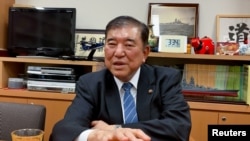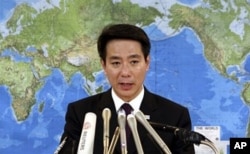China warned Japan on Friday that it should be prepared “to pay a heavy price" if it interferes with Beijing’s plans for Taiwan, the self-ruled island that Beijing considers a breakaway province that must one day reunite with the mainland, by force if necessary.
China’s embassy in Tokyo issued the warning after a visit to Taiwan this week by a bipartisan group of Japanese lawmakers, including former Defense Minister Shigeru Ishiba, a potential candidate to be Japan's next prime minister.
Ishiba, a member of the Liberal Democratic Party, said Taiwan’s President Lai Ching-te and Japan agree that maintaining peace in the Taiwan Strait requires increasing deterrence and resistance against China’s aggression.
Ishiba made the comment at a press conference Wednesday at Taiwan’s Foreign Ministry at the end of the lawmakers’ trip.
After meeting with Lai on Tuesday, he told reporters that the two sides held extensive discussions on avoiding a conflict with China, which some fear could invade and occupy Taiwan as Russia did with Ukraine.
Ishiba noted there is a saying in Japan that "today's Ukraine may be tomorrow's East Asia," which he said the world’s democratic community must prevent by demonstrating the strength of deterrence.
The former defense minister declined to tell the reporters how Japan would react if war broke out in the Taiwan Strait.
Lai said that in the face of China's rise and threat to peace in the Indo-Pacific region, Taiwan would strengthen national defense and economic resilience, support the democratic umbrella with democratic partners, defend the values of freedom and democracy, and maintain regional peace and stability.
Although no specific plan was revealed, the two sides agreed to increase the frequency of exchanges on security issues.
Japan and Taiwan do not have formal diplomatic relations, in order for Tokyo to have formal relations with Beijing, and official interactions between the two remain at the lawmaker level.
But Japan, like most of Taipei’s allies, supports maintaining the status quo between Taiwan and China.
Senator Seiji Maehara, a former foreign minister of Japan and member of the Free Education for All party, said at the Wednesday briefing that he was initially worried Lai would lean toward Taiwan's independence, but that they received assurance he would "maintain the status quo."
Maehara said, "[Lai] is in line with our position, and we are willing to maintain close communication with the people we met during this visit in the future."
Citing threats from China, Russia and North Korea, Japan under Prime Minister Fumio Kishida has been moving away from the pacifist constitution imposed by the U.S. after World War II and last year confirmed plans to double defense spending by 2027.
The plan has unnerved some Asian countries that imperial Japan occupied during the war, such as China.
Kishida announced Wednesday that he would not participate in the LDP leadership election in September, which means he will step down as Japan's prime minister.
Ishiba is considered one of the favorites to become the next LDP leader and candidate for prime minister and said Wednesday that if he got the support of his peers, he would be willing to run for the post.
According to a July 26-28 poll conducted by Nikkei and TV Tokyo, 28% of the public approved of Kishida's Cabinet while 64% disapproved.
The poll asked Japanese people whom they approved as potential candidates for the LDP. Among them, Ishiba was first with 24% support, followed by former Environment Minister Shinjiro Koizumi.
Ishiba, Koizumi and the current minister of digital, Taro Kono, joined forces in the last LDP presidential election and were dubbed the Koishikawa alliance.
Ishiba told reporters that the three were on the same side and would continue to discuss how to improve Japan's politics and regain the people's trust in the LDP.
China’s Friday warning to Japan on Taiwan was not its first. Its embassies in Tokyo and Washington issued similar warnings in February after Japan’s Kyodo News reported that the Japanese and U.S. militaries had for the first time named China as their hypothetical enemy during joint drills.
Japan’s chief of the Defense Ministry's Joint Staff, General Yoshihide Yoshida, however, told a January 25 press conference the exercises "did not envision a particular country or region."
Adrianna Zhang contributed to this report.





